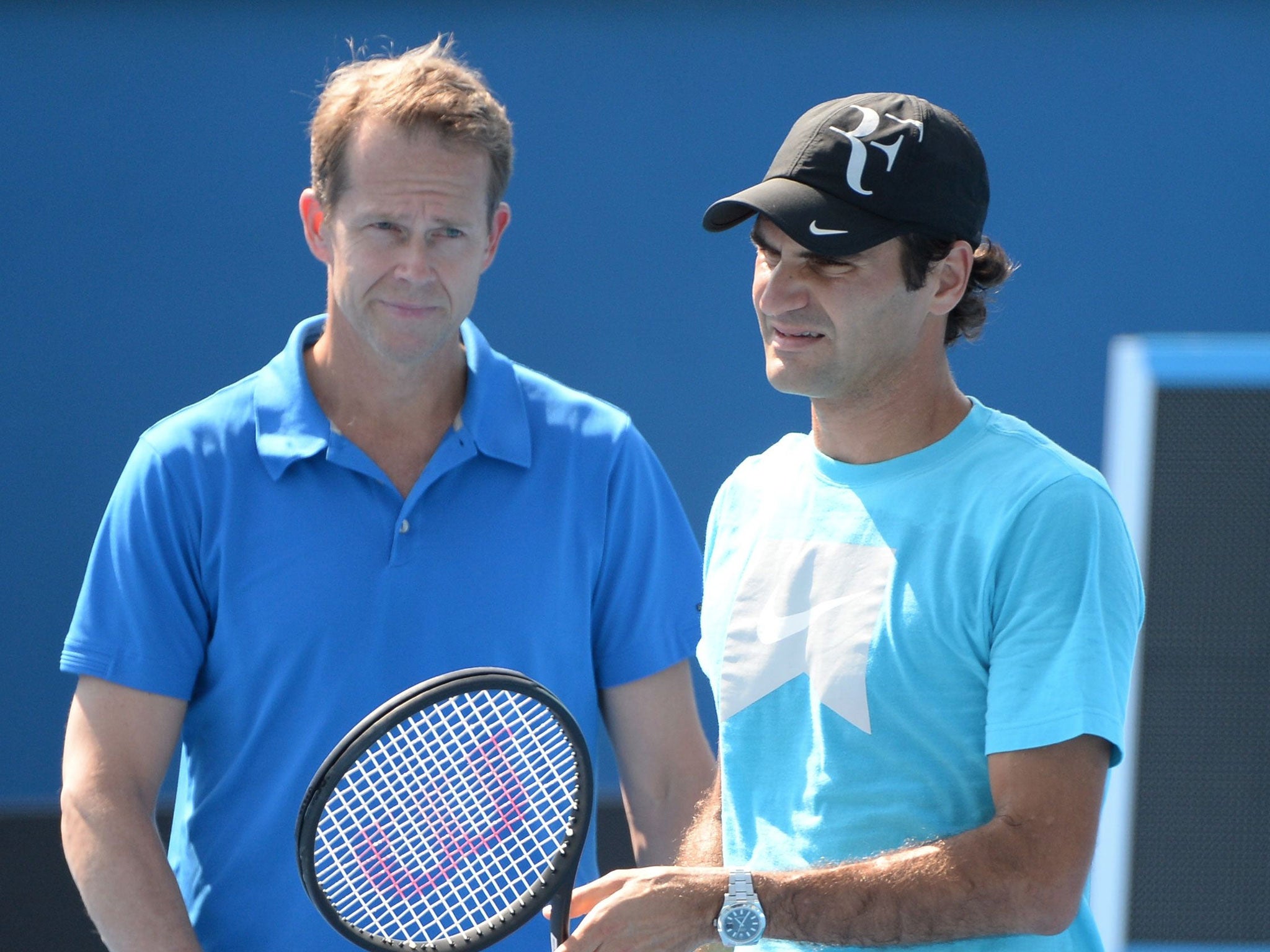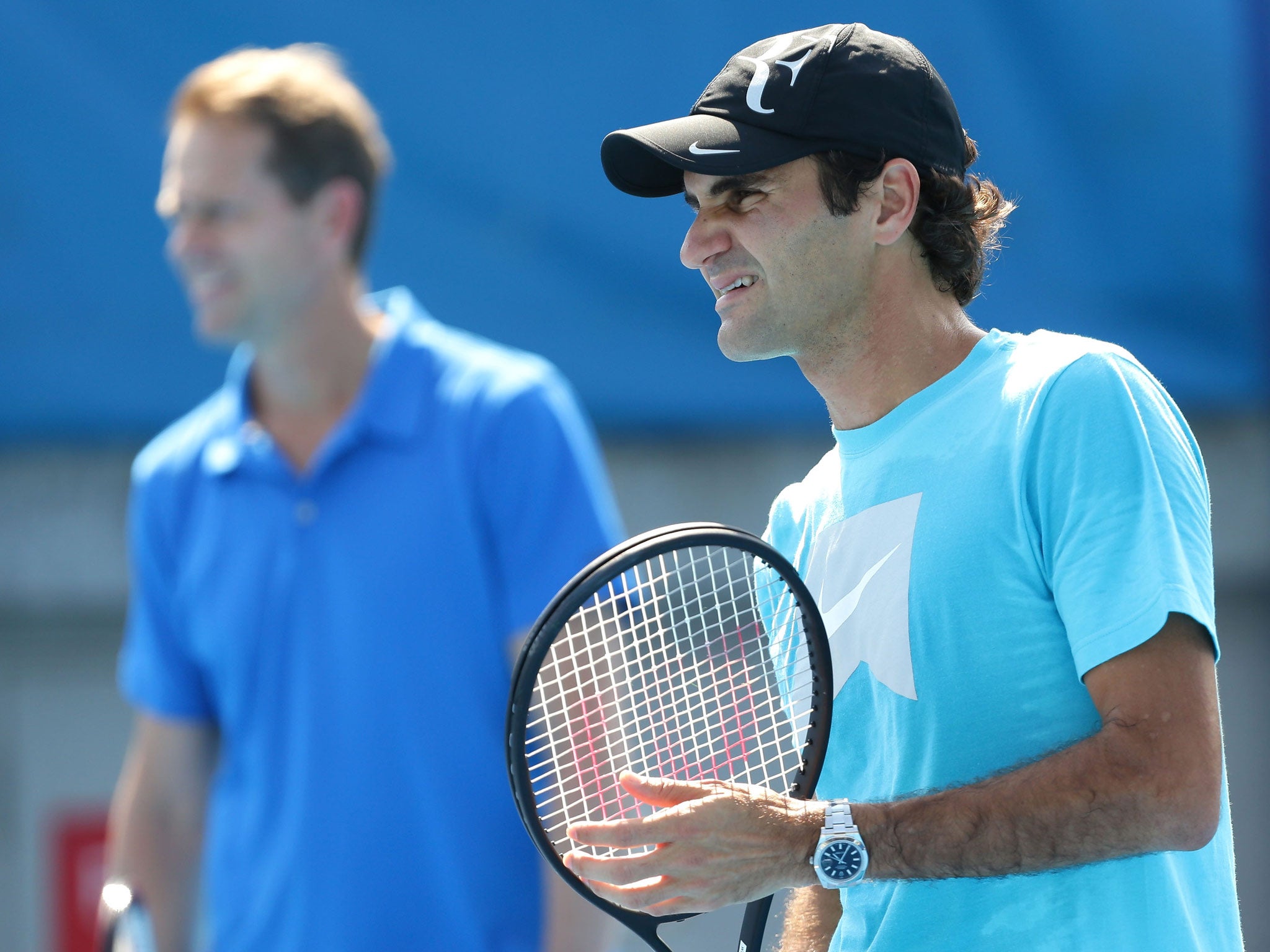Australian Open 2014: Roger Federer drawing from the Stefan Edberg effect ahead of semi-final with Rafael Nadal
The Swede has worked with Roger Federer for just a fortnight but has already helped him get back close to his best – and, the former world No 1 tells paul newman in Melbourne, that involves more than volleying

Your support helps us to tell the story
From reproductive rights to climate change to Big Tech, The Independent is on the ground when the story is developing. Whether it's investigating the financials of Elon Musk's pro-Trump PAC or producing our latest documentary, 'The A Word', which shines a light on the American women fighting for reproductive rights, we know how important it is to parse out the facts from the messaging.
At such a critical moment in US history, we need reporters on the ground. Your donation allows us to keep sending journalists to speak to both sides of the story.
The Independent is trusted by Americans across the entire political spectrum. And unlike many other quality news outlets, we choose not to lock Americans out of our reporting and analysis with paywalls. We believe quality journalism should be available to everyone, paid for by those who can afford it.
Your support makes all the difference.There are still two matches to be played in the men’s singles here at the Australian Open, but one contest has already been won. At the start of the tournament there was speculation as to who would emerge triumphant from the battle of the new breed of coaching legends, but the award can already go to Stefan Edberg. His man, Roger Federer, may not even be through to the final yet – to achieve that he must beat Rafael Nadal on Friday – but such is the former world No 1’s remarkable improvement that the relationship with Edberg is clearly working.
As far as the celebrity coaches go, this has been a non-contest. Boris Becker’s charge, Novak Djokovic, failed to reach the semi-finals for the first time in 15 Grand Slam tournaments. Ivan Lendl saw Andy Murray, rebuilding his game after back surgery, fail to make the semi-finals here for the first time in five visits. Goran Ivanisevic, Michael Chang and Sergi Bruguera watched Marin Cilic, Kei Nishikori and Richard Gasquet go out in the second, fourth and third rounds respectively.
Edberg will work with Federer for just 10 weeks of the year and has barely spent a fortnight with him after an initial trial week in the off-season, but both men are enjoying the experience. Federer, nevertheless, stresses that Severin Luthi, Switzerland’s Davis Cup captain, is his coach.
Luthi, incidentally, will face an interesting test of loyalties if Federer reaches the final. Last night he was in Stanislas Wawrinka’s corner as the Swiss No 2 beat Tomas Berdych 6-3, 6-7, 7-6, 7-6 to reach his first Grand Slam final.
The ice-cool Edberg is much less animated courtside than his old sparring partner Becker, but not as stone-faced as Lendl. Watch him on the practice court and it is as if he has barely been away. It has only been recently that Edberg has started to play on the seniors tour, but in the years when he was off working on his business affairs he clearly kept himself in good shape.
The automatic assumption is that Edberg, one of the all-time great volleyers, has encouraged Federer to get into the net more, but the Swiss points out that he has always been keen to move up the court.
“I used serve-volley against Sampras in 2001 at Wimbledon,” Federer said. “That was like 13 years ago, man. It’s not like I’ve been standing way back in the court like some clay-courter. I’ve always tried to come in. I was actually coming in a lot at the beginning of my career because I didn’t feel I was good enough off the baseline against the great baseliners that were still in the game in my time: Hewitt, Ferrero, Safin, Nalbandian, Agassi.
“Eventually in 2003 I probably realised I could actually also hang with them from the baseline and beat them. That’s when everything changed. Conditions got slower. I improved from the baseline. My movement got solid. I was fit. It was then when I went on a run. But I’ve always enjoyed coming to the net.”
Federer sees Edberg as a voice of experience in his corner. “It’s just a different perspective,” Federer said. “You can take so many things from his experience. I want to say maybe try out a few things that worked for him, try out a few things that he thinks would work out for me this time around.
“He’s here now more for just support, making me feel comfortable, giving me the right advice, pre-match, post-match, discussing it with Severin, my coach. We’re still going through the motions a little bit here. We’re still trying to get a feel for how we want it to be exactly.”
Federer won only one minor title last year – his least productive season since 2001 – and struggled with a back injury. His physical recovery has been the most significant change this year. Federer’s lightning movement around the court and ability to get into position to play his shots was always one of his greatest assets – and those qualities have been visible again here over the last fortnight. Some of his defensive work against Murray was outstanding as he chased down balls he would have struggled to reach last year.
The other significant change has been a new, larger racket. Throughout his career Federer has framed a lot of shots – because he hits the ball with such little margin for error – but he has been striking the ball particularly sweetly here.

“I do believe I have easier power with the racket on the serve,” he said. “It might help me on the return, as well. I hope it is the case. I still need to put many more matches and hours on it, but so far so good.”
However, he added with a smile: “The racket’s not going to do the running for you. I definitely think what I used to do so well was the transition game from defence to offence. I definitely sensed [against Murray] that I am back physically. I’m explosive out there. I can get to balls. I’m not afraid to go for balls. At times last year I couldn’t do it.
“I’ve been feeling really well. Physically I know that I can do it. And then because I’m feeling good physically, I can really think about tactics I want to play, how aggressive or how passive I want to play. I have all these opportunities now. I’ve been hitting the ball really well for some time now.”
During Federer’s mediocre year in 2013 there was increasing talk about his retirement. He still insists he has no plans to give up the game. “Things don’t get easier, but at the same time they might become more enjoyable,” he said. “Maybe I can play with less pressure. Maybe I just love it. I still love competition. I still feel maybe there’s something big around the corner.”
Join our commenting forum
Join thought-provoking conversations, follow other Independent readers and see their replies
Comments